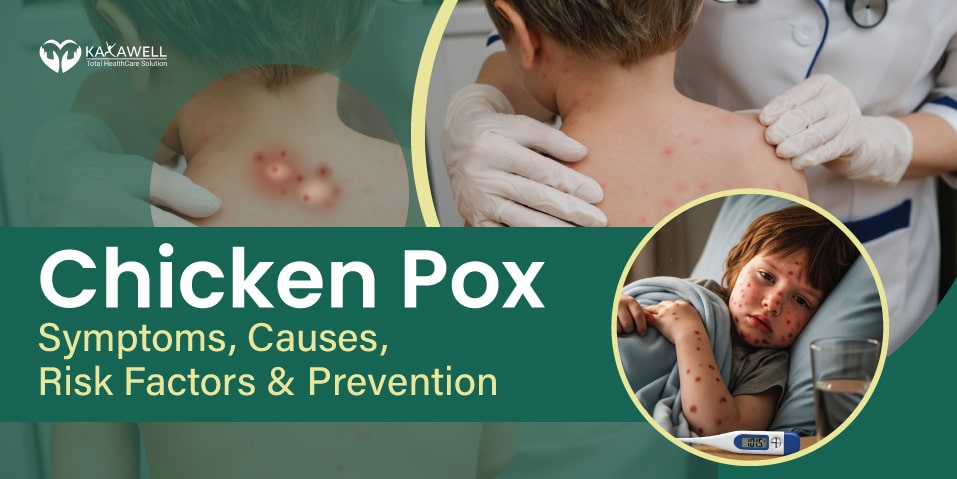Chickenpox is an infection arising from the varicella-zoster virus. These small, fluid-filled blisters cause an itchy rash. Chickenpox is extremely infectious to those who have not had the disease or who have been vaccinated. Today there is a vaccine that protects children from chickenpox. The Centers for Disease Control and Prevention recommend routine vaccination. The chickenpox vaccine is a safe and effective way of avoiding chickenpox and their potential complications.
Let’s know in detail about the Chicken Pox such as symptoms, causes and the prevention tips.
Symptoms of Chicken Pox
The itchy blister rash caused by infection with chickenpox shows 10 to 21 days after exposure to the virus, and typically lasts around 5 to 10 days. Many signs and symptoms that can occur one to two days before the rash include:
- Fever
- Appetite loss
- Headache
- Tiredness and a feeling of being unwell
Once the chickenpox rash shows, three phases follow:
- Raised pink or red bumps, that break out over many days
- Small fluid-filled blisters, that form in around a day and then break and leak
- Crusts and scabs, that cover the broken blisters and take many days to heal
Read Also:Pneumonia: Cause, Symptoms, Risk Factor, And Treatment
New bumps continue to develop for many days, so you could have all three stages of rash — bumps, blisters, and scabbed lesions — at the same time. Before the rash appears, you can spread the virus to anyone for up to 48 hours, and the virus remains contagious until all broken blisters have crusted over.
In healthy children, the disease is usually moderate. In serious cases, the rash may cover your full body, and lesions may form in the throat, eyes, and mucous membranes of the urethra, anus and vagina.
When to see a doctor
Consult your doctor, if you think you or your child might have chickenpox. He or she will typically diagnose chickenpox by analyzing the rash and taking other symptoms into consideration. Your doctor can also recommend drugs to reduce the severity of the chickenpox and treat complications, if necessary. Call ahead for an appointment to prevent infecting anyone in the waiting room and mention that you think you or your child may have chickenpox.
Let your doctor know if:
The rash is spreading to one or both eyes, too.
The rash is very red, moist or soft. This may indicate a secondary bacterial skin infection.
Anyone in the family or house has a problem with his or her immune system or is younger than 6 months.
Causes of Chicken Pox
Chickenpox infection is caused by a virus. This may spread through direct contact with the rash. This may also spread when a person who has chickenpox coughs or sneezes and you inhale the air droplets.
Read Also:Â Malaria-Overview, Symptoms, Causes, Prevention And Treatment
Risk factors of Chicken Pox
Your chance of being infected with the varicella-zoster virus that causes chickenpox is higher if you haven’t already had chickenpox or if you have not its vaccine. It is especially important to get vaccinated for people working in child care or school settings.
Most people who have had chickenpox or vaccinated against chickenpox are immune to the chickenpox. If you have been vaccinated, and still get chickenpox, symptoms are often milder, with fewer blisters and mild or no fever. Some people can get chickenpox more than one time, but that’s uncommon.
Complications
Chickenpox is usually a mild condition. But it may be severe and may lead to complications including:
- Bacterial infections
- Dehydration
- Pneumonia
- Brain Inflammation
- Toxic shock syndrome
- Reye’s syndrome in children and adolescents those take aspirin in chickenpox
- Death
Prevention
The vaccine against chickenpox is the only way to avoid chickenpox. CDC experts report that the vaccine provides full protection from the virus about 98% of people who are consuming both of the recommended doses. When the vaccine does not provide full protection, so it incidences of chickenpox is greatly decreased.
Read Also:Hepatitis B- Overview, Symptoms, Causes, Risk Factors And Prevention
The chickenpox vaccine is recommended for:
Young children: Children in the United States receive two doses of the varicella vaccine the first between the ages of 12 and 15 months and the second between the ages of 4 and 6 years as part of the daily vaccination schedule for children.
The vaccine may be combined with the measles, mumps, and rubella vaccine but the combination may raise the risk of fever and seizure from the vaccine for certain children between the ages of 12 and 23 months. Discuss the pros and cons of combining the vaccines with a doctor for your kids.
Unvaccinated older children: Children between the ages of 7 and 12 who have not been vaccinated will receive two varicella vaccine catch-up doses given at least three months apart. Children 13 years of age or older who have not been vaccinated should also receive two catch-up doses of the vaccine, given at least four weeks
Unvaccinated adults, who have never had chickenpox and are strongly at risk of exposure, This involves health professionals, teachers, child care providers, foreign visitors, military members, adults living with small children and all women of childbearing age.
Adults who have never been chickenpox or who have been vaccinated typically receive two doses of the vaccine, four to eight week. If you don’t recall whether you have had chickenpox or the vaccine, your immunity can be determined by a blood test.
The chickenpox vaccine is not recommended for:
- Pregnant people
- Persons with weak immune systems, such as those diagnosed with HIV or those taking immune-suppressing medicines
- People with gelatin or the antibiotic neomycin allergies
If you’re uncertain about the need for the vaccine, speak to your doctor. If you plan to become pregnant, please contact your doctor to make sure you are up-to-date on your vaccines before conceiving a child.

Leave a Reply
You must be logged in to post a comment.